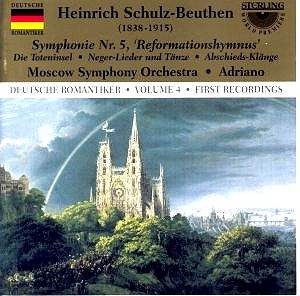I tell you the problem with a disc like this. It encourages
cloud-cuckoo optimists like yours truly to hope for recordings of the
most esoteric of material. After all, how many of you had heard of Schulz-Beuthen
before this? If Bo Hyttner and Adriano can rise to this sort of material
then why not symphonies by Bungert, Cuclin, Knipper, Shaporin, Dzerzhinsky
(piano concertos in his case), Chisholm or Gaze Cooper.
Schulz-Beuthen was Silesian, a composer who like Borodin
was shaken down into the profession of chemist in Breslau. He became
a pupil of Reinecke and Moscheles and studied with them alongside Grieg
and Svendsen. Rejected by the Romantic traditionalists such as Draesecke
he upped sticks to Switzerland and there associated with Mathilde Wesendonck,
Wagner and Gottfried Keller (the novellist on whose book Delius based
his opera ‘A Village Romeo and Juliet’). He produced prolifically including
ten symphonies - eight complete and the last two of which are stubs.
His Seventh King Lear is said to be one of his masterworks. There
are ten oratorios and sled-loads of other music. He was of the same
generation as Brahms, Bruch, Goetz, Draesecke and Rheinberger.
After Switzerland became uncongenial for him he moved to Dresden.
The Fifth Symphony is a product of the composer’s post-Swiss
Dresden years. It is short, in four movements and uses the Lutheran
hymn Ein Feste Burg usually to be heard in the reticent organ
part. The work evinces the grip of Beethoven and Schumann the former
in obstreperous bragadoccio; the latter in an ambitiously onrushing
romance. Other voices also intrude or are pre-echoed. Brucknerian exclamation
jostles with serene Elgarian string writing and in the finale there
is some uproarious brass writing that sounds as if it might have been
influenced by the finale of Sibelius's Second Symphony - loud, unabashed
and bullishly triumphant. Toteninsel was dedicated to Leipzig
University. It is contemporaneous with Rachmaninov's own tone poem.
It is a powerfully introspective work pretty close in atmosphere and
sometimes seemingly in detail to the Rachmaninov work - it exerts a
powerful atmospheric pull. The other two pieces are quite different.
They are light or at least lighter music with much in common with the
marches and dances of the Strausses, Gung'l and Komzak but relieved
by infusions of Dvořák and Brahms in dance-inclined mood. The Abschieds-Klänge
is in some ways Schulz-Beuthen's equivalent of the Elgar Serenade.
Just to note that the Abschieds-Klänge is for
string orchestra. The Fifth Symphony is for organ and orchestra although
the organ makes only the most discreet of contributions.
It says much for Sterling that not only have they tracked
down a pristine condition print of the Böcklin picture ‘Toteninsel’
but their meticulous care has produced the best reproduction I have
ever seen of that painting.
There is now only the need to extend thanks to the
Muscovite orchestra (who do enthusiastic and sterling, if not always
desperately refined, service to the music) and to the rare dedication
and adventurous soul of Adriano. He deserves to be picked up by an orchestra
such as the Albany, the Guildford or the Bournemouth and allowed his
head in selecting repertoire.
Schulz-Beuthen's is an old and forgotten voice liberated
from the music dictionaries. Not of the first rank but certainly he
has something enjoyable to say.
Rob Barnett
EARLIER VOLUMES IN THE STERLING ‘DEUTSCHER ROMANTIKER’ SERIES - reviewed
at Classical Music on the Web
Vol.1: Richard
WETZ Symphony No. 3 Berlin SO/Erich Peter STERLING CDS 1041-2
Vol. 2: Norbert
BURGMÜLLER Symphony No. 1 Hugo STAEHLE Symphony No. 1 Orchester
der Staatstheater Kassel/Marc Piollet STERLING CDS-1046-2
Vol. 3: Paul
BÜTTNER Symphony No. 4 (1917-19)  Berlin
Radio SO/ Gerhard Pflüger (symphony) STERLING CDS-1048-2
Berlin
Radio SO/ Gerhard Pflüger (symphony) STERLING CDS-1048-2
Full details: www.sterlingcd.com


